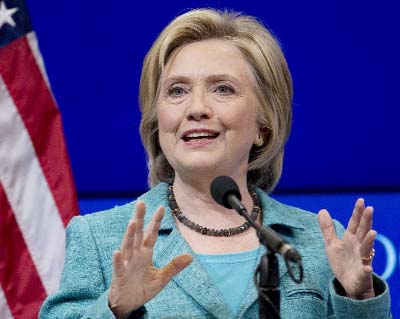
AP, Washington :
Eight years, two presidential elections and one shared commitment to the nuclear deal with Iran later, Hillary Rodham Clinton is delicately resurrecting her 2008 critique of Barack Obama’s approach to world affairs.
n a speech on Wednesday, the Democratic presidential candidate once again positioned herself as the hawkish alternative to the president, her one-time campaign rival, on a series of international issues – starting with Iran.
While offering her strong support for the landmark nuclear agreement with the Islamic nation, the former secretary of state lined her praise with skepticism about the intentions and trustworthiness of the longtime U.S. enemy.
“My starting point will be one of distrust,” she said. “We should anticipate that Iran will test the next president. They’ll want to see how far they can bend the rules. That won’t work if I’m in the White House.”
While none of Clinton’s views is new, her assertive remarks are nonetheless notable in a campaign in which there is little daylight between her and Obama on domestic issues such as the economy, his landmark health care plan and immigration.
Clinton aides said the speech represents the opening of a more aggressive phase of the campaign, during which she plans to sharpen the contrast between her deep expertise in foreign policy and that of her potential Republican opposition.
The strategy won’t be easy. Clinton wants to take credit for the foreign policy victories of the Obama administration – she was, after all, the nation’s top diplomat during Obama’s first four years in office. At the same time, she’s trying to insulate herself against Obama’s critics by casting herself as more assertive than the president she served.
It’s an argument aimed squarely at voters in the general election. Clinton is betting that her ability to speak with authority and in detail will win out over the bombastic rhetoric of Donald Trump and other potential Republican opponents.
An example came Wednesday. Trump slammed the deal during a Capitol Hill rally as the product of “very, very stupid people” and promised that “we will have so much winning if I get elected, that you may get bored with winning.” A few hours earlier, Clinton talked tough by detailing the need to sell F-35 fighters to Israel and help the Jewish state implement better use of tunnel detection technology.
Meanwhile, for Hillary Clinton, sorry seems to be the hardest word.
In the 2008 campaign for the Democratic presidential nomination, one in which she was the frontrunner but ultimately eclipsed by Barack Obama, she steadfastly refused to admit she was wrong to back the war in Iraq.
She only conceded last year that her October 2002 vote to authorise military action against the regime Saddam Hussein – cast when she was a senator from New York – had been a mistake.
Eight years, two presidential elections and one shared commitment to the nuclear deal with Iran later, Hillary Rodham Clinton is delicately resurrecting her 2008 critique of Barack Obama’s approach to world affairs.
n a speech on Wednesday, the Democratic presidential candidate once again positioned herself as the hawkish alternative to the president, her one-time campaign rival, on a series of international issues – starting with Iran.
While offering her strong support for the landmark nuclear agreement with the Islamic nation, the former secretary of state lined her praise with skepticism about the intentions and trustworthiness of the longtime U.S. enemy.
“My starting point will be one of distrust,” she said. “We should anticipate that Iran will test the next president. They’ll want to see how far they can bend the rules. That won’t work if I’m in the White House.”
While none of Clinton’s views is new, her assertive remarks are nonetheless notable in a campaign in which there is little daylight between her and Obama on domestic issues such as the economy, his landmark health care plan and immigration.
Clinton aides said the speech represents the opening of a more aggressive phase of the campaign, during which she plans to sharpen the contrast between her deep expertise in foreign policy and that of her potential Republican opposition.
The strategy won’t be easy. Clinton wants to take credit for the foreign policy victories of the Obama administration – she was, after all, the nation’s top diplomat during Obama’s first four years in office. At the same time, she’s trying to insulate herself against Obama’s critics by casting herself as more assertive than the president she served.
It’s an argument aimed squarely at voters in the general election. Clinton is betting that her ability to speak with authority and in detail will win out over the bombastic rhetoric of Donald Trump and other potential Republican opponents.
An example came Wednesday. Trump slammed the deal during a Capitol Hill rally as the product of “very, very stupid people” and promised that “we will have so much winning if I get elected, that you may get bored with winning.” A few hours earlier, Clinton talked tough by detailing the need to sell F-35 fighters to Israel and help the Jewish state implement better use of tunnel detection technology.
Meanwhile, for Hillary Clinton, sorry seems to be the hardest word.
In the 2008 campaign for the Democratic presidential nomination, one in which she was the frontrunner but ultimately eclipsed by Barack Obama, she steadfastly refused to admit she was wrong to back the war in Iraq.
She only conceded last year that her October 2002 vote to authorise military action against the regime Saddam Hussein – cast when she was a senator from New York – had been a mistake.

